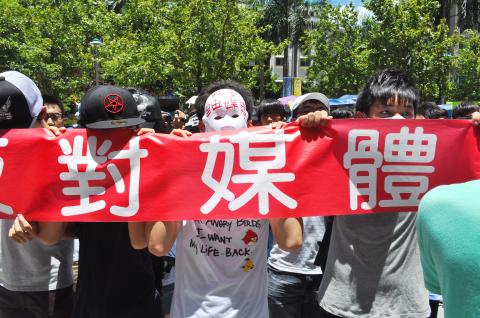|
Want Want deal still
in balance
NOT FINAL: The National Communications
Commission said yesterday it is up to Want Want to adhere to its conditions for
approving the CNS deal, or the deal would be void
By Shelley Shan / Staff reporter

A group of students wear masks at
a protest outside the National Communications Commission in Taipei yesterday
over Want Want China Times Group’s planned acquisition of China Network Systems.
The protesters would only say that they were students when asked who they were,
out of fear of retaliation.
Photo: Liu Li-jen, Taipei Times
The National Communications Commission
yesterday reiterated it had already given conditional approval to Want
Want-China Times Group’s (旺旺中時集團) acquisition of the cable TV services owned by
China Network Systems (CNS, 中嘉網路), adding that the approval would not take
effect until Want Want had fulfilled each and every one of the three conditions
outlined by the commission.
The commission announced its ruling on the deal on Wednesday after reviewing the
case for 18 months. Based on the ruling, Want Want-China Times Group must
fulfill three main conditions: Group chairman Tsai Eng-meng (蔡衍明) and his family
members must completely dissociate themselves from the operations of the CTiTV
(中天新聞台) news channel; the operational plan for the China Television (CTV, 中視)
digital news channel must be changed to make it a non-news channel; and CTV must
establish an independent editorial system.
Aside from the three conditions, Want Want also agreed to 25 “commitments”
listed by the commissioners. Some of the important ones included giving two free
set-top boxes to each household that subscribes to its cable service; providing
a monthly subscription fee below the national average; making high-speed
Internet services with a bandwidth of 100Mbps available by June next year; and
reaching a 100 percent penetration rate for the digital cable TV service by
2014. The group is also banned from establishing new news channels, financial
news channels and home shopping channels.
Andy Shieh (謝煥乾), director of the commission’s legal department, said the
conditional approval was an administrative ruling issued by the commission and
was an unilateral administrative decision, which did not need the approval of
the persons involved in the case. Though Want Want said through the media it did
not agree to the conditions, Shieh said this did not affect the effectiveness of
the ruling.
The three main conditions were set to tackle problems associated with
concentration of media ownership and Want Want Group can decide how it wants to
fulfill those conditions, he said.
“If they do not accept those conditions, we respect that as well,” he said.
Shieh said the group was clearly informed about the conditions during its
interview with commissioners on Wednesday and the group told the commissioners
it would have a problem fulfilling those conditions.
Each of those three conditions must be met, or the approval will not take
effect, Hsieh said, adding that the commission would follow administrative
procedures if the group wanted to reapply.
“If the conditions are not fulfilled, the result will be the same as a rejection
of the bid,” he added.
Want Want China Broadband (旺中寬頻), a subsidiary of the group that launched the
bid for CNS, said in a statement that it can only evaluate how it might enact
the ruling after it receives the official document from the commission, adding
that doing so would require the approval of shareholders.
“Mr Tsai Eng-meng, as the largest shareholder [in CTiTV and CTV], cannot
sacrifice the interests of other shareholders because of his personal investment
in Want Want China Broadband, or they could file lawsuits against him,” the
statement said.
In related news, activists opposing the takeover denied they paid students to
protest.
"I absolutely did not pay any student to come to the protest [on Wednesday],”
said Huang Kuo-chang (黃國昌), an associate researcher at Academia Sinica’s
Institutum Iurisprudentiae. “I have absolutely no idea who did this.”
Huang and several other college professors submitted a petition to the
commission on Wednesday, urging the media regulator to reject the deal. About
200 students later appeared to protest against the merger.
The China Times and China Times Weekly — two publications under the Want Want
China Times Group — showed pictures of the students allegedly receiving cash
from an anonymous woman.
The stories then implied that Huang had mobilized the students for the protest.
Huang said that he only sent e-mails on Tuesday night and asked other college
professors who also opposed the Want Want-CNS deal to come to the commission on
Wednesday, as he had heard the commission would very likely approve the deal.
Huang also said he did not know that a group of students would also show up and
remain after he had left the premises.
Asked if he should investigate who had allegedly paid the students, Huang said
that such matters should only be handled by prosecutors and the police.
National Communications Commission chairperson Su Herng (蘇蘅) weighed in on the
controversy yesterday, saying in an interview with the Chinese-language United
Evening News that the Want Want China Times Group had used the media to express
its dissatisfaction with the ruling on the CNS deal, behavior which she said was
not worth emulating.
The Want Want China Times Group may have its own considerations or decide not to
accept the three conditions.
"The decision is theirs either way,” she said.
|
![]()
![]()
![]()